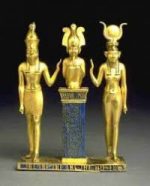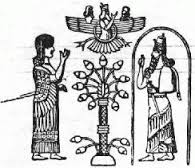יהוה is the Hebrew form of the Name of the Creator. According to most scholars, the most probable pronunciation of this Name is Yahweh. This site uses ‘the Eternal’ when referring to יהוה
“Hear, O Yisra’el: יהוה our Elohim, יהוה is one! Deuteronomy 6:4 [The Scriptures]
No one would know better whether He is one, two or three than the Eternal Himself. Let us assume the Nature of the Eternal is three: three persons in One. We may rightly assume He is capable of communicating this idea to His worshippers if He so chose. Let us assume He wishes to convey this Trinitarian or triune idea to people. How could He go about it? He could be plain, simple, and direct for it is not difficult to say: “I am three” or “I am three in One: the Father, the Son, and the Spirit.”
On the other hand, the Eternal may choose to reveal Himself progressively to His chosen people throughout the Old Testament so that by the end of 39 inspired books the Jews would have an intelligent comprehension of the truth that “God is Three.”
The first verse of the Scriptures is:
Genesis 1:1 In the beginning Elohim created the heavens and the earth
[This site only uses the word ‘God’ for explanatory purposes or for comparison between different versions of Scripture. The form ‘the Eternal’ is used to refer to the Creator]
In Hebrew, the word for ‘God’ is Elohim, which literally means ‘gods’ or ‘powers’.
Now, this could be the first hint to a plurality in the Eternal’s Nature. However, it would infer “gods” without indicating the number. That the Jews did not understand this to be so is the way they translated Hebrew to Greek in the Third Century before Yeshua. They did not use «theoi», which means “gods.” Rather, they used «ho theos» which means “The God” in the masculine singular. Elohim is a ‘majestic plural’.
In the Scriptures’ second verse, something else is first mentioned:
Genesis 1:2 2 And the Spirit of Elohim was moving on the face of the waters.
This word “spirit” is from the Hebrew «ruach» which means either breath or wind. In Greek, this phrase is «kai pneuma theou» or “the breath of The God.” A pneuma or ruach is an invisible force which exerts a pressure like wind. Pneuma is not a person, but is a force. Some translators actually use “wind” instead of the Old English word “spirit.”
In a later verse (26) Elohim (or ho theos), The God, speaks to someone else:
Genesis 1:26 26 And Elohim said, “Let Us make man in Our image" {Us - Majestic Plural}
Is the Eternal talking to Himself as if He were plural? The Jews did not understand that to be so. Their understanding was that these others were angels and other celestial beings – Job 38:4-7. There is no way of knowing, reading from verse 1, who this “us” might include. It is only after thousands of years of retrospection that trinitarians construct a trinity out of Elohim of verse 1, “spirit” of verse 2, and the “Son” (or, the Spirit and the Son) of verse 26. Of course, there remains only one of these identified as Elohim in verses 1 and 26. Nothing in these verses proves the spirit is a person or that the Son is meant in verse 26. These are later ideas imposed on the Genesis text.
What conclusions can we draw from just Genesis chapter one?
– There is the Creator, Elohim (or ho theos verses 1, 26). There is the wind or breath of Elohim moving across the waters. And, there are others implied by “us” and “our” in verse 26. Does it seem fair to conclude that Elohim is not communicating some mysterious three in His nature? If that had been so the Jews would have grasped the meaning right away.
How might Elohim have inspired the verses if He wanted to communicate the plurality of His nature in three persons? It would not have been difficult, with an infinite vocabulary at hand, to have said: “In the beginning, the Three Natures of Elohim created ... and the Third Person was moving over the waters. … And, the plural nature of Elohim said to Himself: “Let us … ” This would not have been difficult.
On the other hand, if the truth is “Elohim is One,” then Genesis 1:1 would mean there was one Elohim. The godly breath or divine wind of Elohim, the Eternal, moved over the waters. Then, in verse 26, Elohim spoke to an unknown number of others who shared in His making of man. No matter how many are involved in the words “us” and “our” there is only one Elohim, the Eternal, giving the command to some unidentified other(s).
THE NAME OF THE ETERNAL – “ONE” OR “THREE”?
In Genesis 2:4 the Name of the Eternal is introduced for the first time. What does this Name mean? Does it convey the idea of a plurality of three, or does it infer only One? There is some disagreement on this. However, when the Jews of the Third Century {before Yeshua} translated the Hebrew יהוה or the Eternal to Greek, they gave the meaning «ho On» which means, according to most scholars: “The One Who Is.” Does the meaning of the Name convey plurality or oneness? It seems fair to state that «ho On» conveys only the idea of One.
Had Elohim wanted to reveal His ‘supposed plural nature’ in three it would not have been difficult to state in some manner something like «ho trias» The Three, or «ho theos trias» The God Three, or The Three-God.
IS THE ETERNAL“ONE” OR “THREE” IN THE OLD COVENANT?
The Jews never comprehended any ‘threeness’ in the Eternal, as the Greek Philosophers or the Egyptian priesthood did. The idea of a triune god, or three gods in one, was right there in the religious cultures of the ancient world. It would not have been a difficult thing to convey this same idea if that is what Yahweh wanted to do. Why convey the idea of One when it was in fact Three, given all the religions that surrounded Israel who already had trinities?
 Osiris, Horus and Isis |
 |
 Brahma, Vishnu and Shiva |
[above are some of the pagan trinities]
It is fair to state that nothing in the Old Covenant conveys the idea of a trinity; otherwise the Jews would have been the first to comprehend the notion. It is only by looking backward through trinitarian filters that triune-obsessed Christian scholars begin to conjure up trinitarian images in Genesis chapters one and eighteen; or, Isaiah 6:3.
(See WHO WERE ABRAHAM’S THREE VISITORS?)
Illustrating this forced interpretation – looking for three when there is only One – is the trinitarian twist to Deuteronomy 6:4 where the «Shema» declares the יהוה to be One. Because the Hebrew «echad» may mean one or first of others, it is argued that this verse becomes the “most explicit declaration of the Trinity in the whole Bible”! Even if one were to accept the quaint trinitarian notion that the Hebrew word for “one” in some way conveys “one of more” it is only by retrospective trinitarian filters this can mean three rather than an unknown number.
IS THE ETERNAL“ONE” OR “THREE” IN THE RENEWED COVENANT?
When we come to the Nazarene Writings (so-called New Testament) we could ask this same question: How would the Eternal go about revealing He was a plural of Three and not just one person alone? This is not difficult to write: “Our Creator is three” or “One with three manifestations”. Nothing even remotely like this occurs.
Yeshua the Nazarene had plenty of opportunities to use the number three in some connection with Elohim. Note:
John 8:16-18: 16 But even if I do judge, My judgement is true, because I am not alone in it, but I and the Father who sent Me. 17 And in your Torah also, it has been written that the witness of two men is true {Deuteronomy 19:15} 18 I am One who witnesses concerning Myself, and the Father who sent Me witnesses concerning Me. {words of Yeshua in purple}
Can anyone deny that abundant opportunity is present here to use the “three” of Deuteronomy 19:15 in revealing the three-fold nature of the Eternal?. Yeshua would have had no difficulty in saying: “As your law states: ‘The witness of three persons is true. I am one who bears witness of myself, and the Father bears witness of me, and the Holy Spirit also bears witness’ “. Yeshua could have actually used the same phrases in the altered text 1 John 5:7 (a trinitarian addition was made to this text in the 14th century (Latin) and in the 15th Greek) had he been a trinitarian.
Shaul (Paul) is not ignorant of the number three for he uses it at 2 Corinthians 12:2 «tritou», 14 («triton»); 13:1 (triton, trion), the later, in the context of quoting Deuteronomy 19:17 and a plurality of persons. Paul also quotes Deuteronomy 19:15, but he adds “three” showing Yeshua could have done the same.
It seems strange indeed that if Yeshua were part of a trinitarian deity – he would surely know this – and miss His opportunity in John 8:17, 18. It is probably fair to state that a real trinitarian would not have included only two in this case but would have conjured up a 1 John 5:7.
[see 1 JOHN 5:7-8 (A TRINITARIAN ADDITION) for more information]
Yeshua has another opportunity when he quotes the Shema of Deuteronomy 6:4 in
Mark 12:29:
And יהושע {Yeshua} answered him, “The first of all the commands is, ‘Hear, O Yisra’el, יהוה our Elohim, יהוה is one.
Understanding what Yeshua meant, the Jewish scribe says: <You are right, Teacher, you have truly said that ‘He is one, and beside him, there is no other>. To which Yeshua says
Mark 12:34
...You are not far from the reign of Elohim.
Yeshua could have easily given the trinitarian explanation of the Hebrew «echad» or the Greek «heis» as indicating three persons. Rather, the Nazarene praises the scribe for his conclusion: “{Elohim} is One, and besides Him, there is no other.” Something which could not be said if Elohim were Three.
This opportunity to involve three in a formula also occurs in Matthew
Matthew 11:27 (Revised Standard Version - RSV) No one knows the Son except the Father, and no one knows the Father except the Son and anyone to whom the Son chooses to reveal Him.
Why would the Son omit the Third Person of the ‘supposed holy trinity’? For surely, if the trinity is true, the Spirit would know the Father and the Son also. It would have been easy to say: “No one knows the Son except the Father, and no one knows the Father except the Son, and the Holy Spirit knows both the Son and the Father as He is known by them.”
(see YESHUA IS NOT YAHWEH)
Shaul also makes it plain that <Elohim is One> ignoring any opportunity to explain the Mystery of the Trinity. Twice in the contexts of others – with the opportunity to form some triune plurality -Paul stresses <Elohim is One> First in Galatians:
Galatians 3:20 20 The Mediator, however, is not of one, but Elohim is one {ho de theos heis estin}.
Paul does this again in 1 Timothy:
1 Timothy 2:5 5 For there is one Elohim {heis gar theos} , and one Mediator between Elohim and men, the Man Messiah יהושע {Yeshua}
Just as there is only “one mediator” and not some plural mediator, there is only one Elohim. In the very context of the plurality of “gods” Shaul speaks of only one Elohim:
1 Corinthians 8:4, 6 4...there is no other Elohim but one. 6 for us there is one Elohim, the Father, from whom all came and for whom we live, and one Master יהושע{Yeshua} Messiah, through whom all came and through whom we live.
Something pops right off the page: the missing Set-Apart Spirit (Holy Spirit). With full opportunity and a mastery of language, Shaul misses the chance to declare: <To us, Elohim is three: the Father, the Master Yeshua, and the Set-Apart Spirit>. It is a simple sentence. Why would the Eternal Himself miss this opportunity to inspire Shaul to declare a ‘triune god’?
Finally, some will immediately want to jump to Ephesians 4:4-6 and what will be declared to be a triune formula. Read it clearly and fairly:
Ephesians 4:4-6 4 one body and one Spirit, as you also were called in one expectation of your calling, 5 one Master, one belief, one immersion, 6 one Elohim and Father of all, who is above all, and through all, and in you all.
Only “One” is declared to be Elohim (God) in these verses. Rather than being a triune formula, it encompasses seven “ones.” It is the “One Elohim” only who is “above all” – which would include the Nazarene “body” and the “one Spirit” and the “one Lord.”
Had Shaul been a trinitarian and had a trinitarian Elohim inspired him, would he have written Ephesians 4:4-6 in this manner? For he omits the Spirit and Yeshua from his declaration of “One Elohim” and includes only the Father who is “above all” including the Spirit and Yeshua.
SUMMARY
The above is presented as a statement of the Biblical truth that <Elohim is One> and not three. It is presented to demonstrate that if “Elohim is Three” the Scriptures seem to go in another direction. It is assumed the Eternal can communicate the simple truth that He is Three and if this is His intent, He falls far short of it in the many declarations that <Elohim is One>.
The Eternal Himself inspired Moshe (Moses) to write
Deuteronomy 6:4
“Hear, O Yisra’el: יהוה our Elohim, יהוה is one!
Source:
Mark Herber Miller – Nazarene Commentary, 2000©. Used by permission.
In the original: the Eternal and Elohim appear as ‘God’; Yeshua appears as ‘Jesus’; the Scriptures appear as the ‘Bible’
Unless otherwise noted, all Scripture was taken from The Scriptures
Copyright by Institute for Scripture Research.
Used by permission.